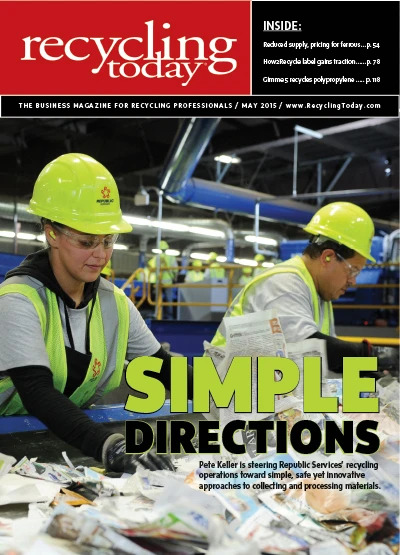Heated solutions
A sandwich toaster served as inspiration for four college students in search of a recycling solution for PVC- (polyvinyl chloride-) coated polyester fabric.
Students at Monash University, based in Melbourne, Australia, worked with the Vinyl Council of Australia (VCA) and local PVC manufacturers and recyclers to find cost-effective, useful ways to recycle PVC into new products.
One reprocessing idea included the sandwich toaster, where the students flattened the material like a patty. Other processes incorporated were heating, vacuum forming and gluing layers of banners as a sheet and grinding the banners into 1 to 5 millimeter pieces.
When these techniques were repeated using industrial scale equipment, such as hot rollers, at various manufacturers’ premises, both sheet and tile-like products were produced.

Pave the way
 When the city of Minneapolis asked Delano, Minnesota-based EarthPavers LLC to come up with a low-maintenance alternative to grass for an 8-foot-wide space separating the curb from the sidewalk, owner Joe Lemmerman knew the right replacement.
When the city of Minneapolis asked Delano, Minnesota-based EarthPavers LLC to come up with a low-maintenance alternative to grass for an 8-foot-wide space separating the curb from the sidewalk, owner Joe Lemmerman knew the right replacement.
EarthPavers sells and installs AZEK Pavers, which Lemmerman used in the more than 3,600-square-foot area in the downtown arts center. Made with up to 95 percent postconsumer recycled material—including scrap tires and various plastics, mostly polypropylene (PP) from recovered food containers and DVD cases—AZEK Pavers serve as a cost-effective and environmentally friendly option to concrete or brick pavers, according to AZEK’s Maureen Murray.
Fitting into an innovative grid system and at less than half the weight of traditional pavers, the AZEK Pavers install up to three times faster than other pavers, with no special tools or masonry wet saws required, Murray says.
23.5 million: pounds of scrap tires and plastics recycled since AZEK’s inception
Challenging campuses
A little competition never hurt anyone, and in this tournament’s case, the environment ultimately won.
 Nearly 400 colleges competed in RecycleMania, a national campaign that ran from Feb. 1 to March 28 to heighten recycling awareness on college campuses to challenge students, faculty and staff to increase on-campus recycling rates. The 4.5 million students who participated did just that by recycling and composting 80.1 million pounds of materials.
Nearly 400 colleges competed in RecycleMania, a national campaign that ran from Feb. 1 to March 28 to heighten recycling awareness on college campuses to challenge students, faculty and staff to increase on-campus recycling rates. The 4.5 million students who participated did just that by recycling and composting 80.1 million pounds of materials.
In its 15th year, the program introduced a “3R Actions Challenge” this year that invited students to share their reduce, reuse and recycle actions through photos on social media or via a mobile app.
For the second year in a row, Antioch University Seattle took top prize as Grand Champion of RecycleMania by recycling or composting 96 percent of the campus’ waste with just 4 percent going to landfill.
To view complete category results and other RecycleMania competition winners, visit www.recyclemania.org.
129,411: metric tons of carbon dioxide equivalent reduced through RecycleMania in 2015
Do you have a unique recycling-focused story? Please send a press release to Megan Workman at mworkman@gie.net.

Explore the May 2015 Issue
Check out more from this issue and find your next story to read.
Latest from Recycling Today
- Aqua Metals secures $1.5M loan, reports operational strides
- AF&PA urges veto of NY bill
- Aluminum Association includes recycling among 2025 policy priorities
- AISI applauds waterways spending bill
- Lux Research questions hydrogen’s transportation role
- Sonoco selling thermoformed, flexible packaging business to Toppan for $1.8B
- ReMA offers Superfund informational reports
- Hyster-Yale commits to US production





